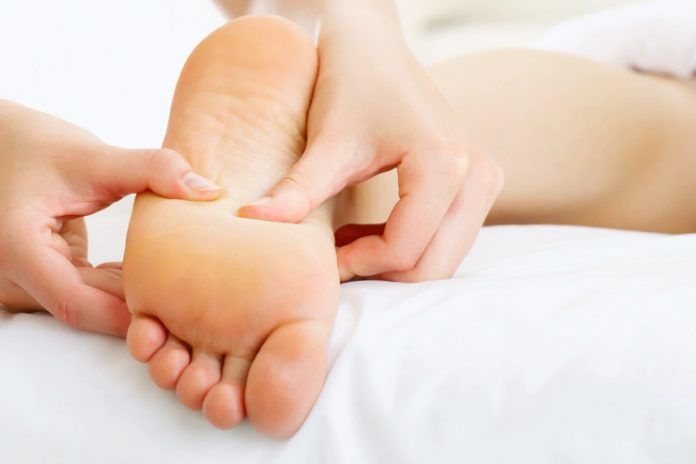Affiliate Disclaimer
Some links in this article are affiliate links. We may earn a small commission if you make a purchase through these links, at no extra cost to you. We only recommend products we find useful to our readersHave you ever found yourself sleeping with everything good and well and then sometimes waking up with swollen feet? Happens quite often, doesn’t it? Before you jump around fretting about what is wrong with you physiologically, try and read through the article to help yourself through the process.
Swelling of the feet can range from a number of underlying health ailments which is why it is necessary to be aware of any form of an underlying health condition to be able to treat it from the roots rather than beating around the bush. While the condition is often bothersome and uncomfortable, it is not always a matter of much concern as one can get rid of swollen feet easily, because, for the most part, it is temporary.
In this article, we are going to be discussing the common physiological reasons for swollen feet that not many people are aware of along with a list of effective natural remedies for swollen feet that can help provide with relief from the uneasiness and pain (sometimes).
What are Swollen Feet?
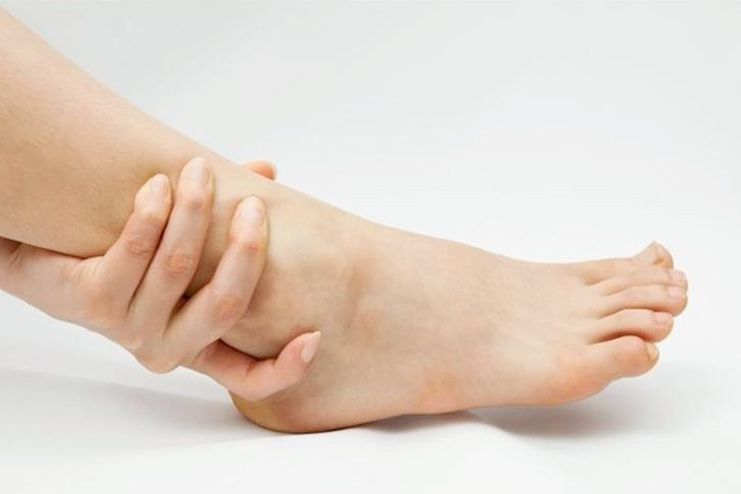
Swollen feet are nothing but the inflammation of the feet for several of the underlying health ailments or even for any temporary sprain that could have been inflicted without you possibly know it. But, for the most part, the swollen feet is often because of any kind of underlying health condition.
If you are here experiencing the swelling in your feet accompanied by a few other accessory symptoms, there are chances that there might be something serious which won’t go away with a quick fix for swollen feet but might require some extensive professional expertise.
What Causes Swollen Feet?
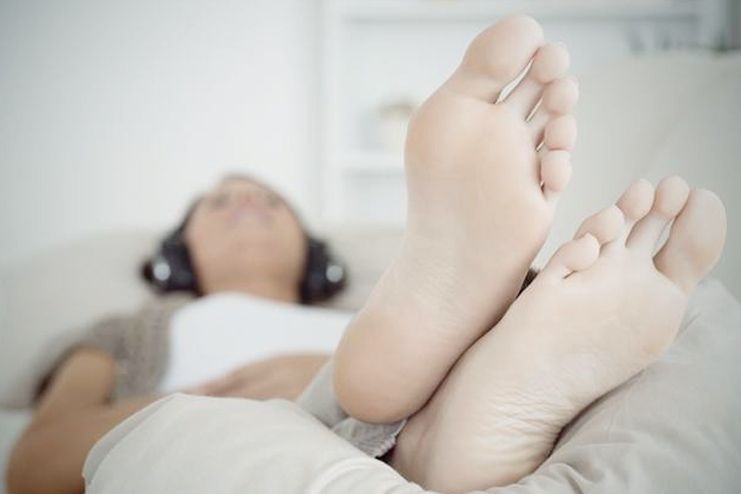
As mentioned above, the list of reasons behind the swelling in the feet is often very extensive. While it may be something as trivial as a normal sprain that you got during an injury, it can also be very well a symptom of edema or accumulation of fluid which is never a good reason to be left idle without any kind of treatment.
Some of the common reasons for swollen feet include:
- Edema: Edema is a condition that is characterized by the excess accumulation of fluids and water inside the tissue which is what results in swelling and puffiness around the area of the accumulation. This is the kind of problem that is often hindered and caused by a number of reasons, the excess consumption of salt being one of the few. Edema is very effectively seen in the feet and the hands and ankles as well.
- Excess Alcohol Consumption: While you may be here wondering how alcohol affects the possibility of swollen feet, it actually does. The consumption of alcohol often tends to end up increasing the water retention in the body which can contribute to inducing swelling in your feet. But, it is also believed that the swollen feet caused because of excess consumption of alcohol often subsides within a few days itself. If it doesn’t, that’s when you need to consult a doctor. If the symptoms of swollen feet are persistent every time you drink alcohol, it is time to get your vitals checked because the same can be a reason behind an underlying liver condition.
- Pregnancy: Pregnancy is yet one of the most common causes behind swollen feet. This is primarily because the body starts retaining more water and starts producing more body fluids and blood during this time period which is why the feet starts to swell because of the excess fluid accumulation around the body. This kind of pregnancy symptoms is often witnessed during the fifth month of the pregnancy. The extensive time period of standing and being on your feet during pregnancy is one of the common reasons for swollen feet.
- Lymphedema: Even this is a form of edema that is caused because of the removal or the dysfunctionality of the lymph nodes in the body. Lymph nodes are an important site for the filtration of the fluid that passes through it. Inhibition in its functions often end up resulting in arresting the drainage of the fluid out of the lymph nodes and thus the accumulation is what we see as swelled up feet.
- Hot Weather: This is often a very selective reason because not the majority of the people suffer from swollen feet because of it. During the hot climate, the body’s normal coping mechanism is to expand the veins for improved blood flow for cooling down your body. As a minute side effect from this process, the fluid tends to migrate out to the adjoining tissues. Majority of the people who heftily suffer from common circulatory problems tend to be more prone to have problems with the weather being a possible reason behind swollen feet.
- Kidney Problems: This is one of the most common reasons behind swollen feet. Defects in the kidney result in the body having a higher concentration of salt in it which is definitely what results in your body retaining more water than necessary. The excess retention of water is what causes the excess inflammation of the feet.
- Liver Disease: Liver disease is yet another common factor that affects the overall functioning of the liver, thereby, contributing to the accumulation of the fluid in and around the feet, causing excessive swelling. Some of the common contributors of liver diseases include excessive consumption of alcohol, viral infestation or even obesity.
- Blood Clot: Any kind of blood clot in the body ends up posing an obstruction to the blood flow which, for the most part, causes swollen feet and ankles because of the reduced blood flow to the heart and other parts of the body. These kinds of symptoms are often times seen on one side of the body.
Some of the other commonly sourced causes behind swollen feet include:
- Infection
- Side effects of medication
- Heart failure
- Chronic venous inefficiency
- Injury
Home Remedies for Swollen Feet
 There is a wide range of possibilities when it comes to the spectrum of home remedies for swollen feet. If you are here trying to source what to do for swollen feet, this section is the one for you to indulge yourself in.
There is a wide range of possibilities when it comes to the spectrum of home remedies for swollen feet. If you are here trying to source what to do for swollen feet, this section is the one for you to indulge yourself in.

Check Out the Most Popular Self Care Tips for Swollen Feet
1. Aloe Vera for Swollen Feet
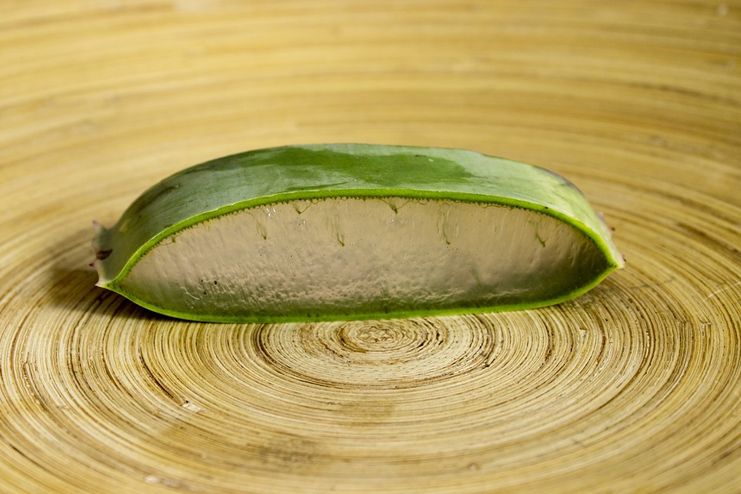 The effective and pronounced anti-inflammatory properties (R) of the aloe vera are very effective in getting rid of the excessive inflammation that is often caused by several of underlying reasons. The application of aloe vera helps in healing the inflammation that is often times uneasy and painful at times too.
The effective and pronounced anti-inflammatory properties (R) of the aloe vera are very effective in getting rid of the excessive inflammation that is often caused by several of underlying reasons. The application of aloe vera helps in healing the inflammation that is often times uneasy and painful at times too.
What To Do?
- Cut an aloe vera leaf and scoop out the pulp from it
- Apply this generously to soothe swollen feet
- Leave it on
- Repeat this 2-3 times a day to see effective results
2. Compression Socks for Swollen Feet
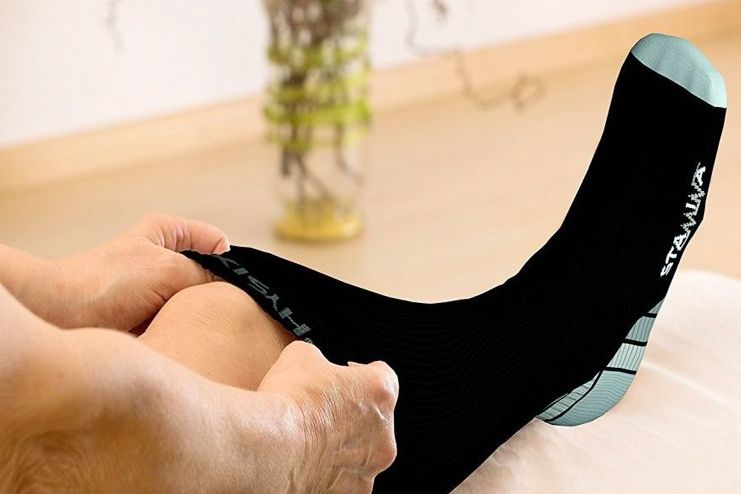
The compression socks are manufactured with a comfortable yet stretchy material which makes sure to prevent any excess buildup of fluid around the feet and ankles. These compression stockings or the socks help keep the area around the feet compressed to ensure that there is no buildup of fluid and even if there is any, the pressure from the stockings help drain out the excess fluid out of the feet, thereby breaking down the possibility of further committing to the worsening condition of the swollen feet.
What To Do?
- Buy a pair of compression socks or stockings of your size and wear it during the day
- Leave it on throughout the day while you are walking or continuously active
- Wear this for a few days to reduce the swelling of the feet
- Make sure to avoid during the night because the excess pressure on the feet with lack of activity can inflict adverse effects on the overall body
3. Apple Cider Vinegar for Swollen Feet
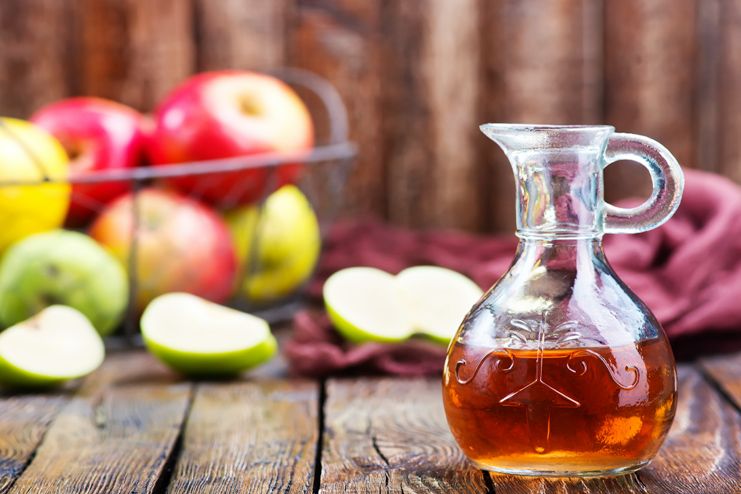
Apart from the effective anti-inflammatory properties of the Apple Cider Vinegar, it is also loaded with potassium which helps prevent the water retention in the body which is the primary cause behind the inflammation in the feet, ankles and the adjoining areas.
What To Do?
For the Soak
- Mix equal quantities of warm water and apple cider vinegar in a tub
- Wet a towel in that mixture and wring out the excess liquid
- Wrap your feet in that towel and let it stay like that for 15-20 minutes
- Repeat this process once every day to treat swollen feet
For Consumption
- Mix two tablespoons of unfiltered apple cider vinegar to a glass of water
- Drink this once every day in the morning to stop swelling feet
4. Epsom Salt Foot Soak for Swollen Feet
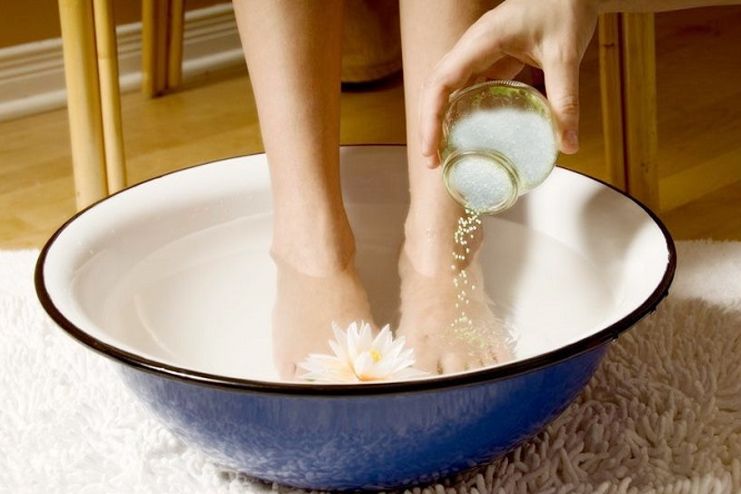
It is the combination of magnesium sulfate (R) which is found in the Epsom salt that helps reduce swelling of the feet. It easily seeps into the skin of the feet to help dissolve the accumulated fluid which is what one the primary causes for swollen feet is. The Epsom salt foot soaks help in boosting the overall blood circulation, thus aiding in a quick fix for the swollen feet. It also helps subside the pain along with the inflammation.
What To Do?
- Mix 2-3 heaped tablespoons of Epsom salt to a foot soak tub filled with warm or cold water
- Let the salt completely dissolve into the water
- Soak your feet completely in the water and let it stay for 15-20 minutes
- Repeat this process 2-3 times daily for remarkable results
5. Baking Soda for Swollen Feet
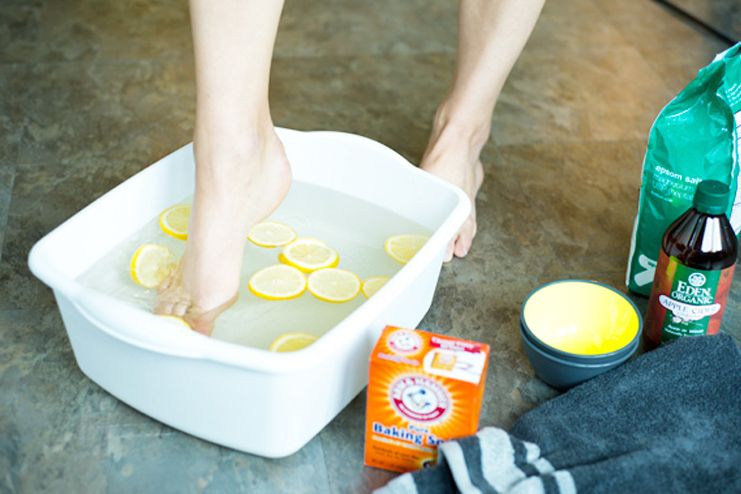
The baking soda and rice water paste are very effective in getting rid of the inflammation around the feet and the ankles. If you didn’t know any better, the sodium carbonate has effective anti-inflammatory (R) properties, which, when combined with the starchy component of the rice water, helps in drawing out the accumulated fluid around the feet, thus reducing the swelling. It also helps boost the blood circulation around the area.
What To Do?
- While draining the water after cooking rice, use a strainer to save the rice water
- Add a few tablespoons of baking soda to the rice water to make a smooth paste
- Apply this paste on your feet and let it dry for 15 minutes
- Wash it off under some running water and pat dry with a towel
- Repeat this once daily till the swelling completely reduces
6. Cabbage for Swollen Feet
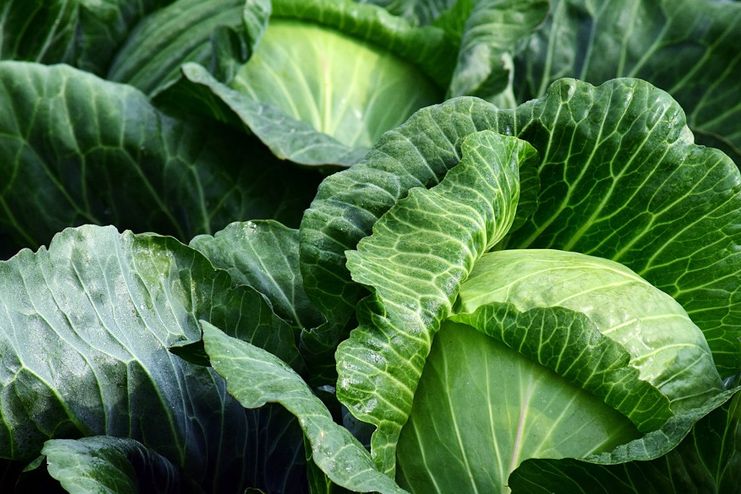 As absurd it might sound and seem like, cabbage actually has amazing properties in aiding with the swelling of the feet. The water absorption property (R) of the cabbage helps draw out the excessive amount of accumulated water and fluid from the feet. Apart from that, it also showcases anti-inflammatory (R) properties which further help in the prevention of further swelling in and around the feet.
As absurd it might sound and seem like, cabbage actually has amazing properties in aiding with the swelling of the feet. The water absorption property (R) of the cabbage helps draw out the excessive amount of accumulated water and fluid from the feet. Apart from that, it also showcases anti-inflammatory (R) properties which further help in the prevention of further swelling in and around the feet.
What To Do?
For the wrap
- Wrap a few leaves of cabbages around your swollen feet and secure everything with a bandage
- Leave it on 30 minutes and then remove them
- Repeat this a few times till the swelling subsides completely
For consumption
Increase the consumption of cabbage in your daily diet.
7. Cold Compress for Swollen Feet
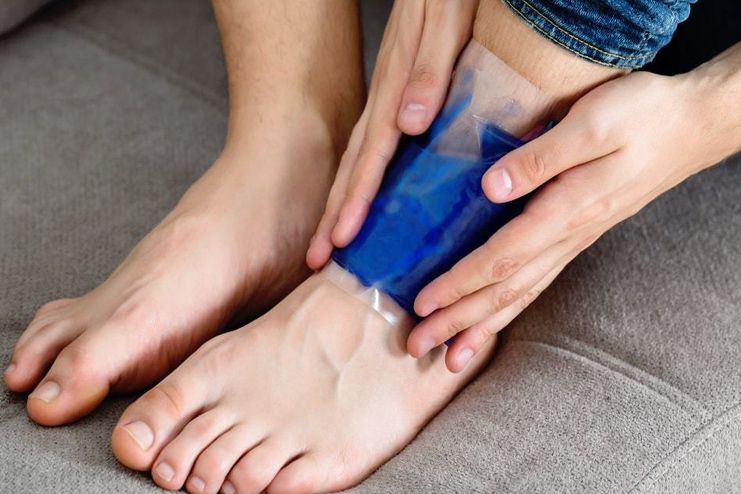
The primary mode of action that is witnessed with the cold compress (R) is the fact that it helps in regulating the altered blood circulation which is exactly what helps in reducing and helps soothe the swollen (R) feet. This is one of the most common and tried and tested natural remedies for swollen feet which actually do work.
What To Do?
- Freeze an ice pack in the freezer and place it on the swollen area
- Let it sit there for 10 minutes. Make sure you move the compress continuously in an interval of few minutes to avoid making the area numb.
- Repeat this twice a day to witness effective results.
8. Tonic Water for Swollen Feet
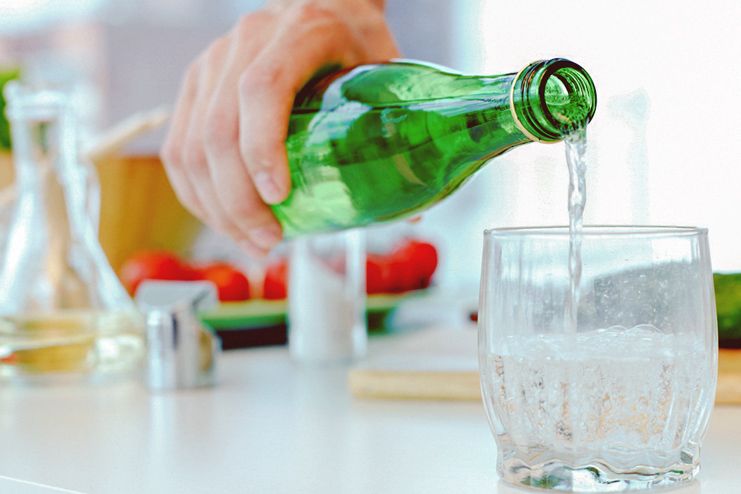
If you are someone who has been living under the rocks for years and doesn’t know what tonic water is, let me brief it out for you. Tonic water is nothing but carbonated water which has a dash of quinine added to it. If the mention of quinine didn’t ring a bell, tonic water was primarily used as a treatment for malaria. With that being said, it is also used to reduce swelling from the feet, primarily because of the anti-inflammatory properties.
The combination of the anti-inflammatory properties (R) of the quinine as well as the relaxant property of the carbonated drink helps to treat swollen feet effectively.
What To Do?
- Fill a foot tub with tonic water, enough to immerse your swollen feet
- Let it soak in for 15-20 minutes
- Remove it from the tonic water and rinse your feet in the normal water
- Repeat this once every day till the swelling completely subsides
9. Parsley Tea for Swollen Feet
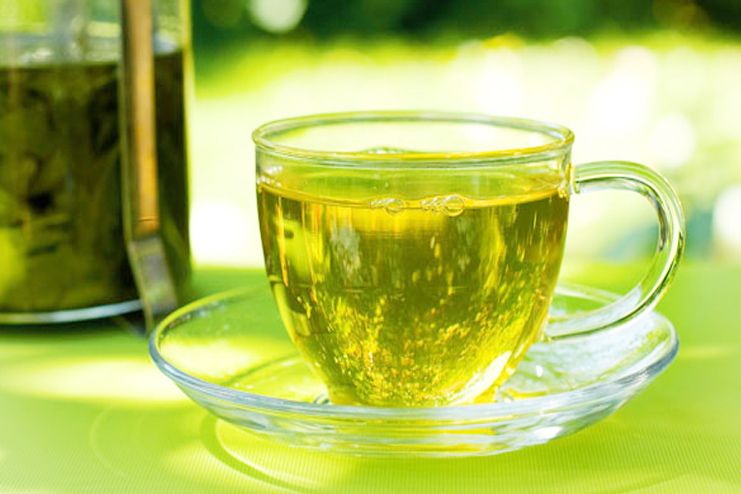
If water retention is the primary reason behind the swelling in your feet, the consumption of parsley tea can effectively tone it down for good. Parsley is a natural diuretic (R) which ensures to increase the frequency of urination, thus preventing any possibility of water retention in the body that could contribute to further swelling of the feet and the area around the ankles. Parsley also has mild anti-inflammatory (R) properties.
What To Do?
- Steep some parsley leaves in a cup of warm water
- Let it steep for 5-10 minutes
- Drink it once or twice daily as a swollen feet remedy
- Repeat this for a few days till the signs and symptoms of swelling go away
10. Lemon Juice for Swollen Feet
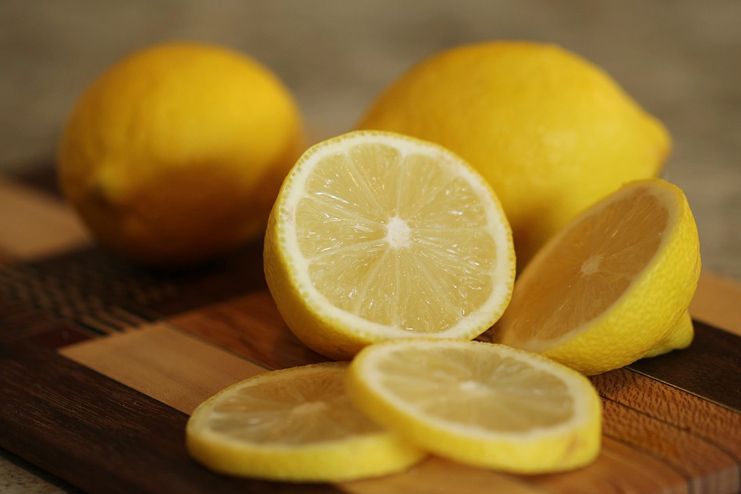 Lemon juice, with a combination of a few other ingredients like cinnamon, milk and olive oil have amazing benefits in treating the swelling in the feet. Not just that, it helps subside the inflammation and also helps with the pain that is often times inflicted because of the accumulation of the fluid in the feet. The combination of these ingredients helps heal the inflammation (R) and rejuvenates the feet (R) as well for a speedy recovery. [Read more about Lemon Water Benefits]
Lemon juice, with a combination of a few other ingredients like cinnamon, milk and olive oil have amazing benefits in treating the swelling in the feet. Not just that, it helps subside the inflammation and also helps with the pain that is often times inflicted because of the accumulation of the fluid in the feet. The combination of these ingredients helps heal the inflammation (R) and rejuvenates the feet (R) as well for a speedy recovery. [Read more about Lemon Water Benefits]
What To Do?
- Take 1 tablespoon of lemon juice, 1 tablespoon of cinnamon (R) powder, 1 teaspoon of olive oil and 1 teaspoon of milk into a bowl
- Mix all these ingredients together to make a smooth paste
- Apply this on the swollen feet and leave it on for a few hours
- Best opt for this remedy during the night before going to sleep
- Repeat this every night till the symptoms of swelling die down
11. Essential Oils for Swollen Feet
 A combination of various essential oils as a soak for the feet is very beneficial in not just subsiding the inflammation (R) but also with providing with a relaxing feeling and getting rid of the uneasiness that many feel because of the swollen feet. It has alleviating properties which help with the swelling subside completely.
A combination of various essential oils as a soak for the feet is very beneficial in not just subsiding the inflammation (R) but also with providing with a relaxing feeling and getting rid of the uneasiness that many feel because of the swollen feet. It has alleviating properties which help with the swelling subside completely.
What To Do?
- Fill a bucket halfway with some warm water
- Add a few drops of eucalyptus (R) oil, peppermint oil and doterra oil into the water
- Soak your feet in it for 15 minutes
- Remove after that and pat dry your feet with a towel
- Repeat this every day till the pain and inflammation subsides completely
12. Barley Water for Swollen Feet
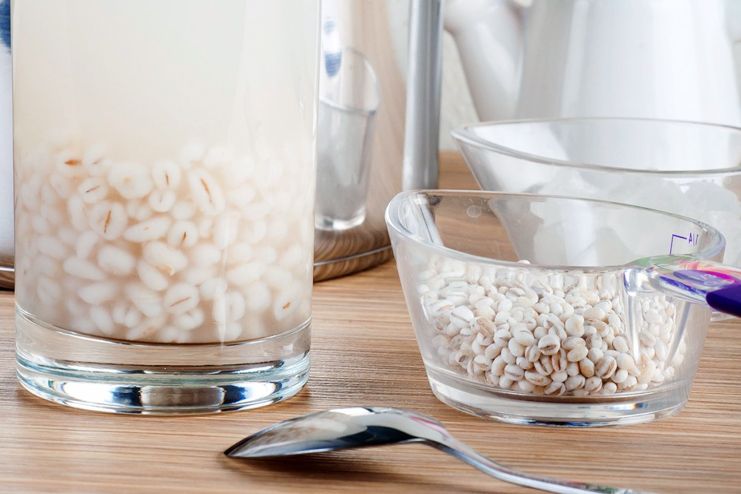
While this concoction is not that pleasant one one’s palate, it has amazing benefits in making your urinate frequently because of its effective diuretic properties. This helps in washing away the excess fluid retention along with cholesterol and toxins in the body (R) and thus gets rid of the swelling in the feet. [Read more about Barley Tea Benefits]
What To Do?
- Boil a few tablespoons of barley in a pot of water
- Bring to this a boil till the water changes colour to a light brownish colour
- Strain this liquid and drink 1-2 glass of it regularly for swollen feet treatment
13. Coriander seeds for Swollen Feet
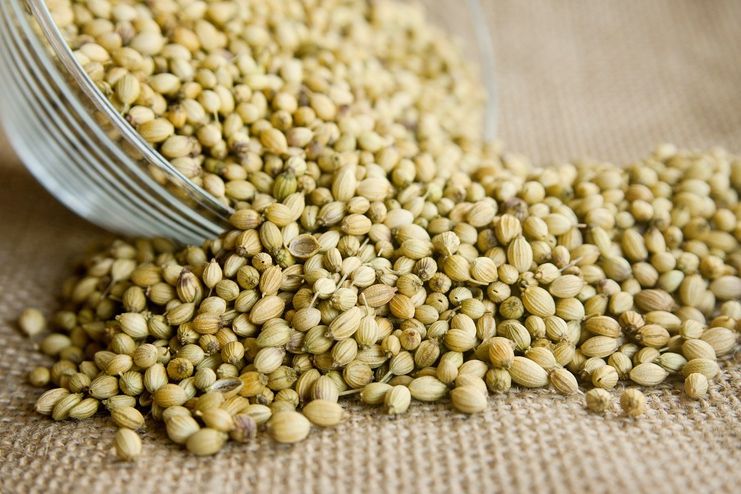 Much like the preceding natural remedy, even this one is loaded with beneficial amazing diuretic properties which help in increasing the frequency of urination that helps in getting rid of the excess accumulated fluid and water that’s often retained in the body. This helps alleviate the edema and helps get rid of swollen feet.
Much like the preceding natural remedy, even this one is loaded with beneficial amazing diuretic properties which help in increasing the frequency of urination that helps in getting rid of the excess accumulated fluid and water that’s often retained in the body. This helps alleviate the edema and helps get rid of swollen feet.
What To Do?
- Boil some water in a pot
- Add 2-3 tablespoons of coriander seeds to the water
- Boil to reduce the concentration by half
- Strain the liquid and bring it to room temperature
- Drink this once or twice daily
14. Ginger for Swollen Feet
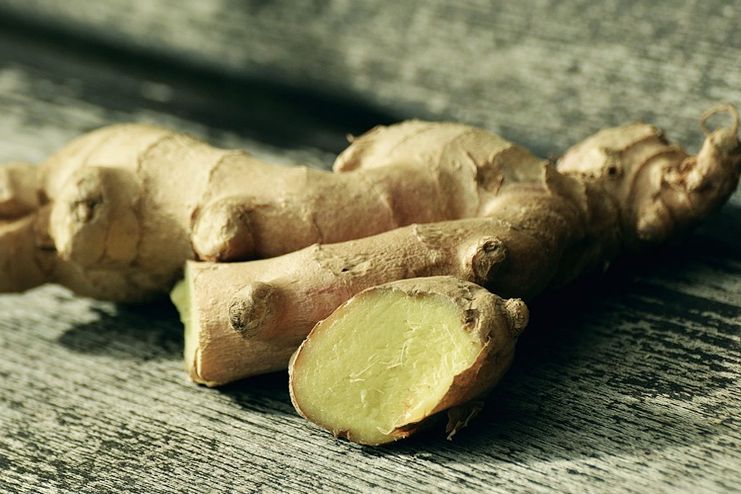 In order to treat swollen feet, it is the ginger essential oil that plays a significant role in it. Ginger is loaded with natural anti-inflammatory properties (R) which are beneficial in treating the swollen feet by boosting the proper circulation of the blood throughout the feet and the entirety of the body. It also helps prevent the cramping and the associated pain one feels because of the inflammation.
In order to treat swollen feet, it is the ginger essential oil that plays a significant role in it. Ginger is loaded with natural anti-inflammatory properties (R) which are beneficial in treating the swollen feet by boosting the proper circulation of the blood throughout the feet and the entirety of the body. It also helps prevent the cramping and the associated pain one feels because of the inflammation.
What To Do?
- To any carrier oil, add a few drops of ginger oil and mix well
- Massage your feet with the combination of the oils for a good 5-10 minutes to let the oils seep into the skin
- Leave it on overnight
- Repeat this every night till the inflammation completely subsides
15. Grapefruit Oil for Swollen Feet

Grapefruit oil has an effective combination of not just anti-inflammatory (R), diuretic as well as antimicrobial properties which effectively help in treating the problems associated with the inflammation around the feet.
What To Do?
- Mix a few drops of grapefruit essential oil to any carrier oil
- Apply this on the affected part of the foot
- Massage it into the skin
- Leave it overnight
16. Massage therapy for Swollen Feet
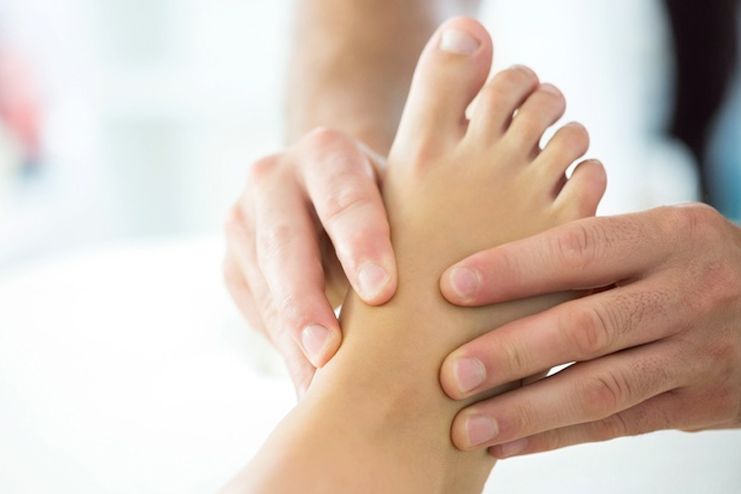
A simple massage therapy is more often than not the only remedy one needs to opt to reduce swelling in the feet effectively. The applied pressure helps boost the blood circulation in and around the feet which aids in channeling the blood and the accumulated fluid, thereby helping to stop swelling feet.
What To Do?
Get an appointment for a professional foot massage and get it done to help treat the swelling of the feet.
17. Magnesium Rich Foods for Swollen Feet
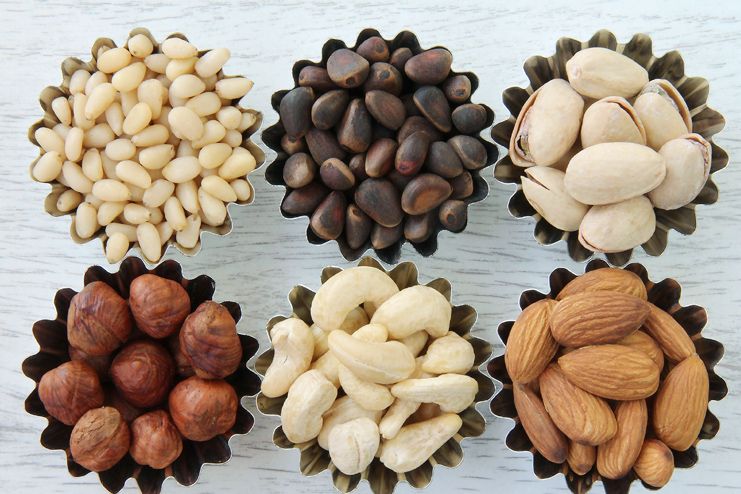
While many people tend to think that consumption of magnesium tends to increase the water retention (R) in the body, it does the complete opposite of it. The magnesium in the body helps in reducing the water retention in the body which is exactly what helps in swollen feet treatment. So, if you are here wondering what to do for swollen feet, the easiest way is to increase the magnesium intake in your daily diet.
What To Do?
Increase the intake of magnesium in your diet. Some of the magnesium rich foods include dark chocolate, almond, tofu, cashews, spinach, avocados etc.
18. Potassium Rich Foods for Swollen Feet

Often times, the deficiency of the potassium in the day to day diet ends up contributing to hypertension and induces water retention (R). If potassium supplementation in your daily diet is not going to interfere with your health, try and increase the consumption of potassium rich foods to keep the signs and symptoms of swollen feet at bay.
What To Do?
Increase the consumption of potassium rich foods on a daily basis. Some of the potassium rich foods include bananas, pistachios, chicken, salmon, white beans etc.
19. Walking for Swollen Feet
 Walking is a very effective remedy to treat swollen feet. Lack of physical activity or prolonged lack of mobility in the body is often times a contributing factor to the signs and symptoms related to swollen feet. Walking helps in boosting the blood circulation and keeping these problems at bay.
Walking is a very effective remedy to treat swollen feet. Lack of physical activity or prolonged lack of mobility in the body is often times a contributing factor to the signs and symptoms related to swollen feet. Walking helps in boosting the blood circulation and keeping these problems at bay.
What To Do?
- Indulge yourself in a quick stroll if you have been standing or sitting for a longer period of time.
- For sustained and long-term benefits, try and start morning walks of 30-40 minutes on a regular basis to keep your body energised, improve blood circulation and keep your mind fresh.
Symptoms of Swollen Feet
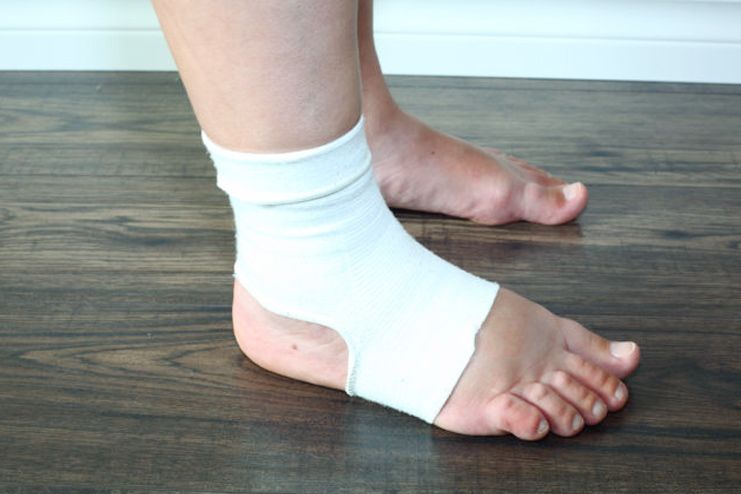
While the name itself is more enough of a symptom for the condition of swollen feet, there are some categorized signs and symptoms that one needs to watch out to categorise their inflammation as a common happenstance or possible edema.
Some of the common symptoms of swollen feet include:
- Inflammation and puffiness around the feet and the ankles alike
- Pressing of the finger on the swollen feet tends to create indentations which resort back to the original state of inflammation once the applied pressure with the finger is removed
- Visible indentations and marks on the feet of the shoes and socks that one wears
- The colour of the skin around the inflammation is often paler in comparison to the rest of the leg or feet
- Visible presence of the blood vessels on the feet due to the increased fluid pressure around the feet
How to Prevent Swollen Feet?
 One of the common reasons for swollen feet is because of the sedentary lifestyle that we lead. Subjected physical activity in an individual is very effective in keeping the blood circulation in check, thus ensuring that there is no effective accumulation of fluid or water in the body.
One of the common reasons for swollen feet is because of the sedentary lifestyle that we lead. Subjected physical activity in an individual is very effective in keeping the blood circulation in check, thus ensuring that there is no effective accumulation of fluid or water in the body.
Some of the common modes of prevention of swollen feet include:
- Exercising and being engaged in physical activity is very important to ensure proper rate of blood circulation throughout the body. The better the blood circulation, the lesser are the chances of accumulation of fluid, be it for a blood clot or even some other physiological reasons. The World Health Organisation suggests a total of at least 150 minutes of moderate physical workout every week for a healthier well being.
- Consistent sitting or standing in the same place without any kind of mobility always contributes to swollen feet. So, if you are looking for a prevention method, make sure that if you are on your feel, you are not static in a single position but walking around the room to ensure that the blood circulation is well boosted throughout the body.
- Salt intake is a prime factor in reducing the body’s water retention capacity. If the salt content in the body is high, the rate of water retention will be more which adversely affects the body, given the fact that it is what contributes to edema in the feet and other parts of the body.
When to See a Doctor for Swollen Feet?
 Swollen feet might signify a number of underlying health conditions as mentioned in some of the above paragraphs. If the swelling is persistent and doesn’t wither down completely even after the administration of the suitable natural remedies, that’s when you know that there’s something seriously wrong.
Swollen feet might signify a number of underlying health conditions as mentioned in some of the above paragraphs. If the swelling is persistent and doesn’t wither down completely even after the administration of the suitable natural remedies, that’s when you know that there’s something seriously wrong.
If the swelling remains even after 4-5 days and has some accessory symptoms with it, it is time to reach out to a professional and get the problem diagnosed and possibly checked out for any worse condition as well.
Make sure that you always reach out to a professional who is well known and knows what he is doing.
Swollen feet can be a contributing factor to a lagging quality of life. The uneasiness and discomfort along with the accessory problems simply tend to make every situation worse. If you are here suffering from such similar symptoms, it is time to actually try out these natural remedies for swollen feet and if the same doesn’t work, reach out to a medical professional.
In this Article
















